Having arrived at our new digs in Calangute, we rebooted our mind operating system by catching Zs, and soon we were ready to explore this new sector of the planet.
“Let’s find a spot on the beach and have lunch,” I said fiddling with Google maps to find a path to the beach. The app was practically useless given that many of the streets were not mapped and the navigation indicator kept jumping on the screen.
“Let’s just wing it,” Bianca said.

Out on the alleys, we quickly got disoriented. But then we saw a couple of tourists with towels heading down a sandy road.
“Let’s follow them,” I said.
The heat was merciless as the sunlight streamed down our heads, and its warmth rose from the sand.
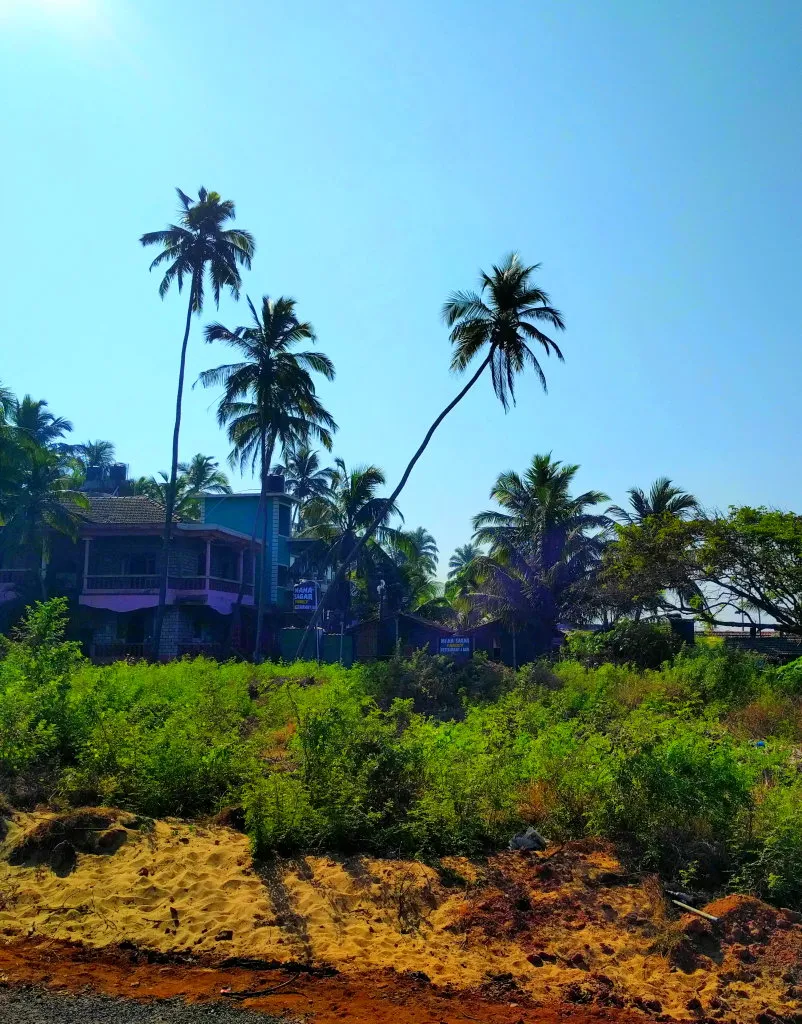
Once in a while, a motorcycle would race by us in the desolate road, beeping repeatedly for no particular reason except habit. Back home, the act of beeping at someone is usually considered an aggressive act or stern warning that collision is possible if you don’t pay attention. Sometimes a beep can be a friendly salute. In India beeping is more like a form of communication- a navigation strategy based on echolocation to create a spatial sound-scape of traffic and thus avoid collisions. This is one of the most difficult things to adapt to if you’re used to quiet streets with only the slow hum of traffic.
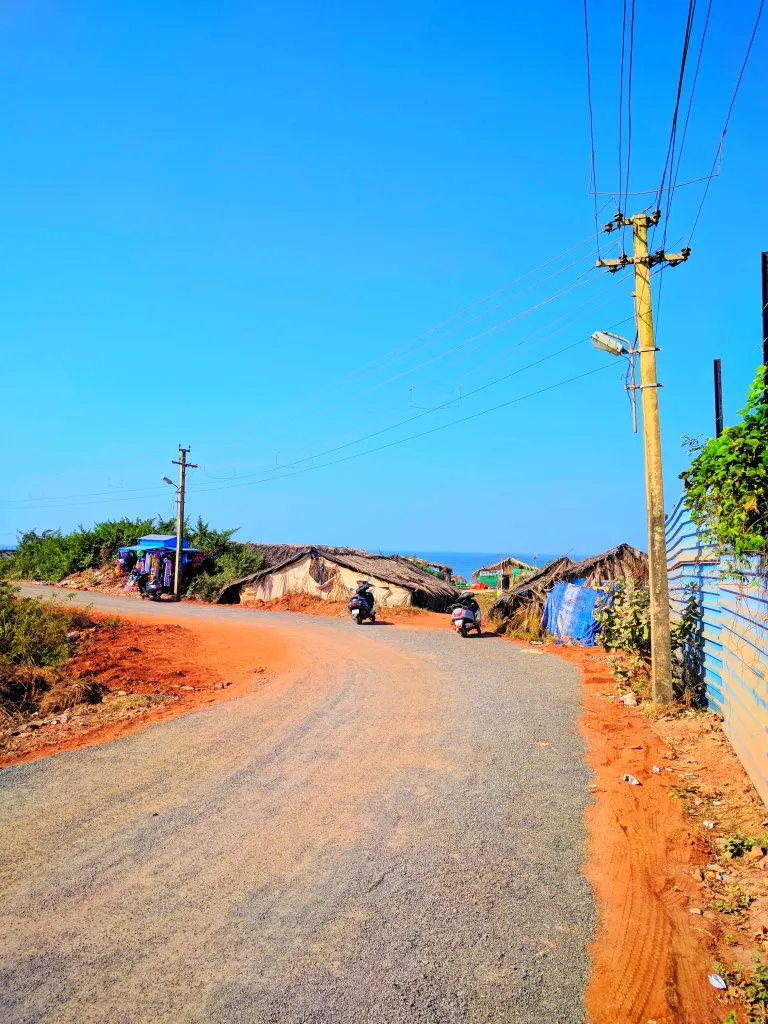
Thatched-roof huts lay on either side of the road looking dilapidated and ready to come crashing down any day now. I could see old pieces of furniture scattered in some of them.
“Maybe they’re for storage,” I said.
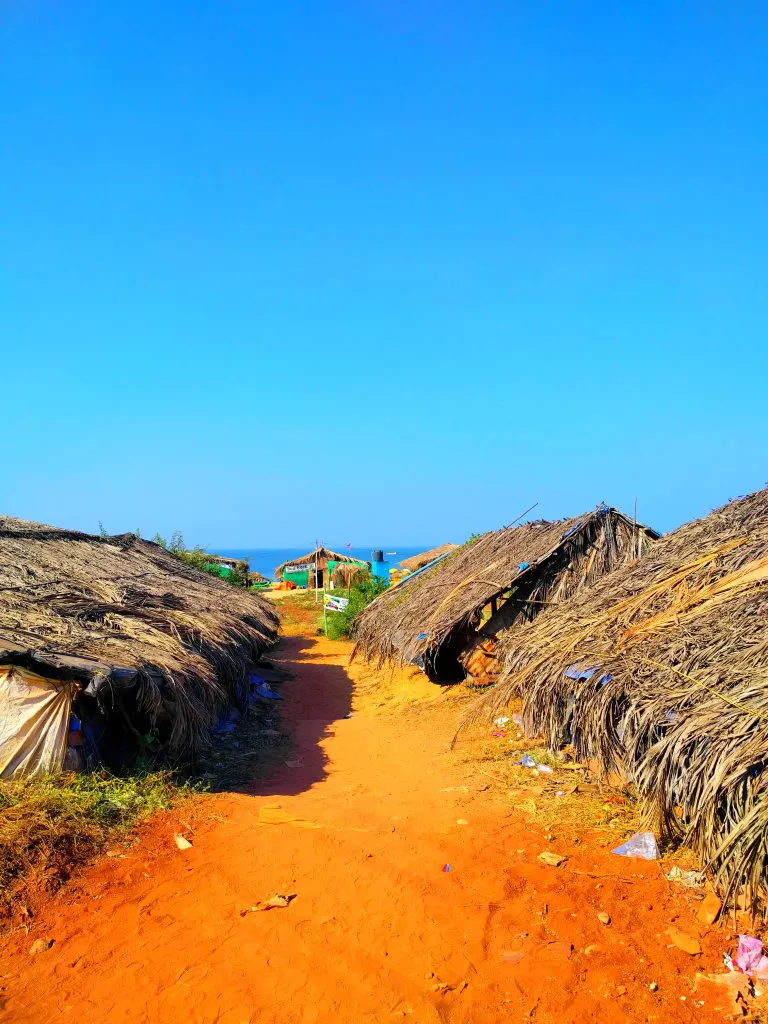
Up ahead, the shacks gave way to a majestic view of the sea, even more spectacular than Agonda. The beach stretched for miles in either direction.
“Amazing!” I said.
“So much bigger than Agonda,” said Bianca.
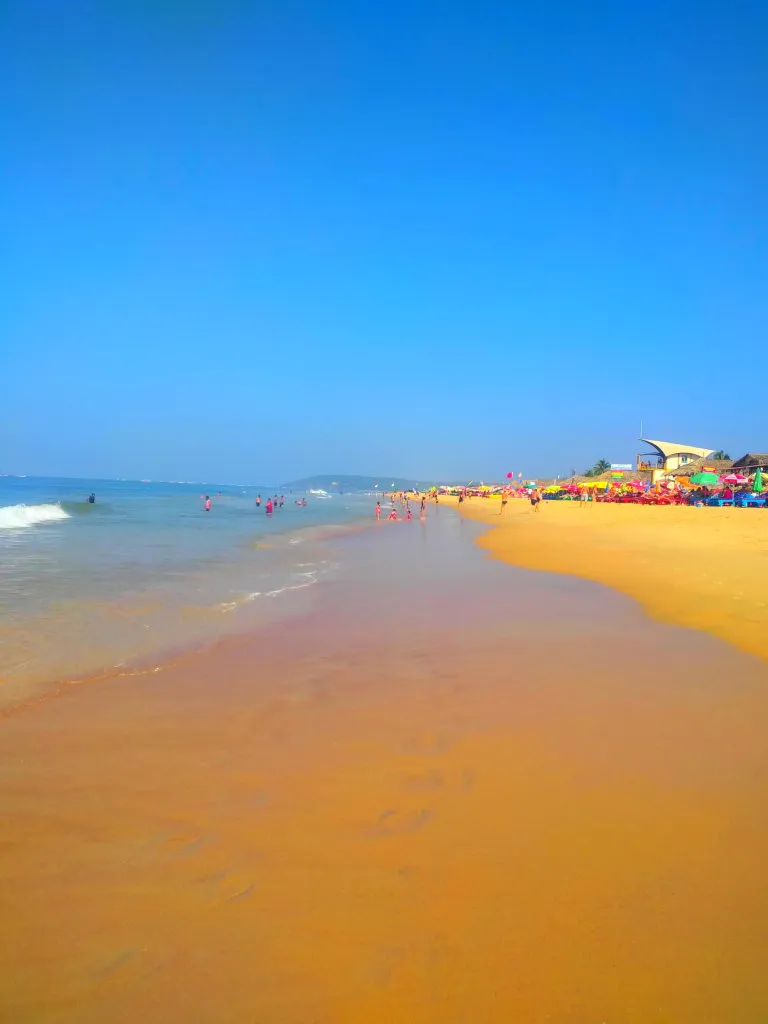
Open-air restaurants lined up the edge of the beach, built along the narrow strip of palm trees that stretched as far as the eye could see. Young Indian males congregated along the edge of the water, a few girls played shyly in the waves, and scattered groups of semi-naked western tourists lounged on chairs in front of restaurants.
“The cycle of life continues,” I said in my David Attenborough tone.
A few boats graced the horizon, and on the hazy blue sky, parasails hovered above the sea.
The tepid breeze did little to cool me down and seemed to be stripping away the moisture from my skin. Dressed in sneakers, pants, brown shirt, and Indiana-Jones-style hat, I was in no position to be walking around such a hot place at this time of day.
I noticed that each restaurant had small flags from different European countries- Britain, Russia, Switzerland, and so on- and this made me wonder about the reason behind it. Later, I heard from a hotel worker that some Europeans didn’t like each other’s company, the British and Russians for example were notorious for getting into brawls. This was an ongoing problem that even caused the closure of some events because the Brits and Russians couldn’t keep their hands off each other. So perhaps by raising a specific countries flag above the restaurant, locals were able to direct the flow of nationalities.
As there was no Canadian flag waving in the breeze, we chose the closest one with two red flags rising above it. For the most part, the customers were Western tourists. Some of the men sat without shirts on. The heat was brutal on the beach, but double-standards with women aside, why was it always the flabby old men hanging out without shirts?
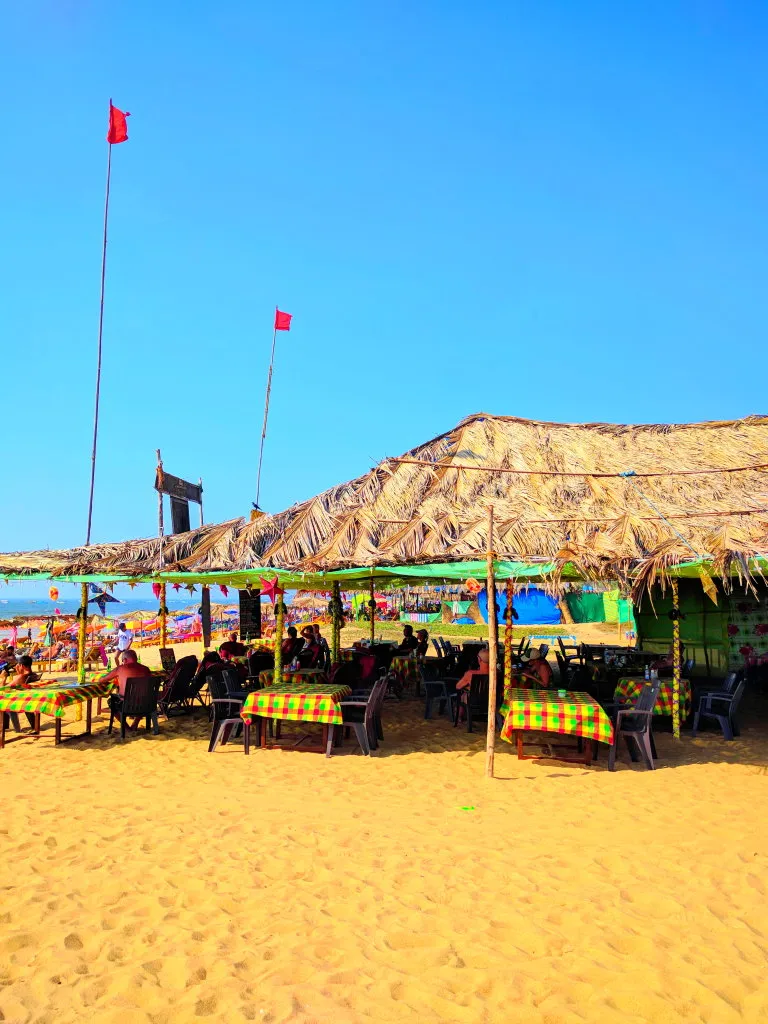
We found a table with an excellent broad view of the sea. On the table beside ours, sat some British tourists enjoying a few cold ones. Behind us, there was an Indian couple with kids, and another table with a Russian group.
We ordered a couple of Kingfisher beers, and sat back to watch the slow pace of life on the beach.
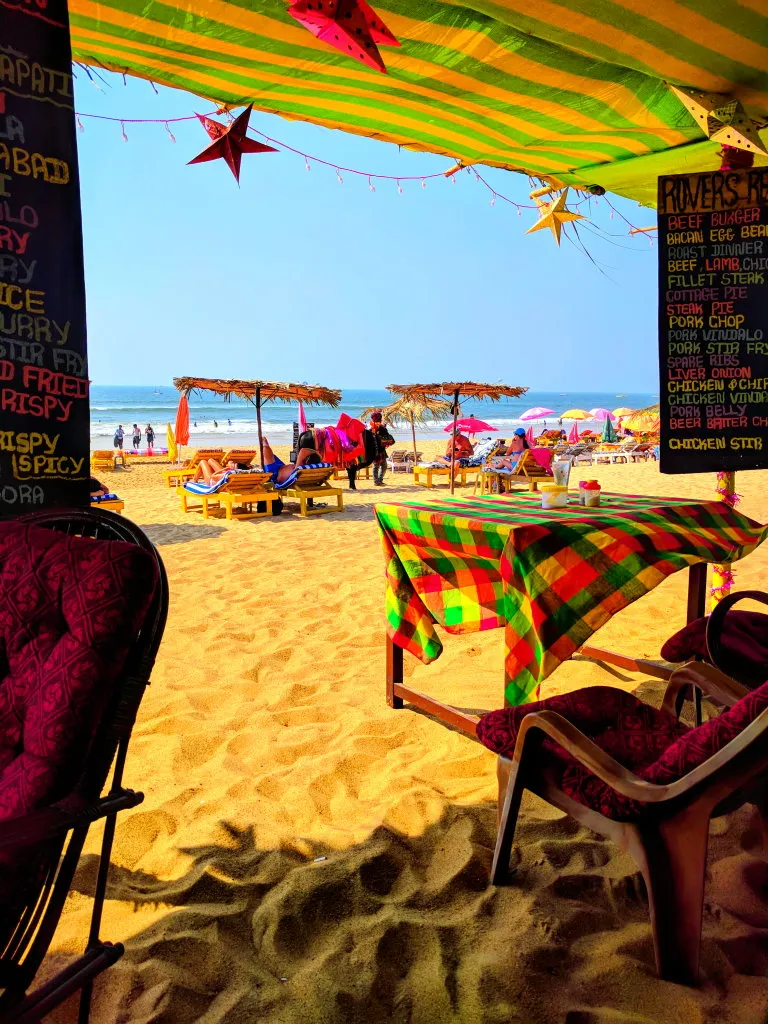
“The size of the beach is crazy. You can’t even see the end,” I said staring across the great expanse of sand with scattered groups playing in the waves and boats lying on their side like beached whales.
After some time, the waitress brought us the menus.
“It doesn’t have the prices,” I said to Bianca.
“Should we go somewhere else?”
“With that heat out there? I’m willing to pay the special price. Besides, we have a priceless view out here.”
The service moved at a glacial place, and it took almost an hour to get our meal, but it was absolute delight.
Though I kept getting the sense that we had to be somewhere doing something, we were in no particular rush to go anywhere. Adjusting to this rhythm required readjusting expectations, settling down the calculating monkey-mind, and just going with the flow. This is a key point. In everyday life, we’re either being pushed or pulled, and blindly get tossed about in the maelstrom of responsibilities. When you’re able to loosen the cords that bind you to survival, then at that moment you reach an alteration in consciousness. This is important to the travel experience, and something that is missed in the breathless details of travel writers. We tend to look at these new places with the old fogged-up glasses of our culture. To truly embed ourselves in a new cultural matrix and reach a climax of inter-cultural bliss, we must first take off those glasses and let our naked neural eye balls perceive with clarity.
While savoring our meal, a Lamani lady showed up with a little girl of about five years of age. The lady sat on the sand just outside the restaurant and began drumming a hectic tune as her child began to contort with carefully choreographed acrobatic dance moves. The little girl was dressed in colourful traditional clothes, dangling jewelry, and carefully painted face. She ended her performance by locking arms behind her back and doing an impressive shoulder-dislocating maneuver to bring her arms back to the front.
Bianca winced.
After her routine, the little girl went around from table to table requesting donations. Some patrons gave her money while others did not. I was not keen on supporting this particular performance because I couldn't be certain that the child had not been coerced into it, but how can you deny a little girl a few rupees when you’re stuffing yourself with delicious food and drink? That's the genius of the enterprise, you see. The moral quandary.
Bianca asked the little girl her name, and the little girl answered with a shy smile.
We gave her a donation, and she returned to the lady, whom I presumed was her mother.
The Lamani people were sometimes called the “gypsies” of India, and their presence on Goan beaches was apparently a hot-button issue that included threats by politicians to forcefully evict them from beaches where they sold their wares and services to tourists. This ethnic group fascinated me. I was particularly enthralled by their playful wily nature, deep dark skin, lean beautiful faces, and aesthetically-pleasing high cheekbones. We would later interact with a few of them on the beach.
Soft music began to play behind us. It sounded like an old radio song. The Russian customers began to sing, raising their voices loudly for everyone to hear. To my untrained ear, the song sounded like one of those patriotic songs they used to sing back in the 20th century during the Soviet era. On the one hand, I was delighted at this cross-cultural demonstration. On the other hand, I was quite annoyed by the overbearing tones of the piece. The British on the table beside us, who had up to that moment been quite chatty, suddenly grew silent and surly. They simply drank and stared at the sea as the Russians sang their song. Stiff upper lip, eh?
The sun was still blazing by the time we finished lunch. We stood on the beach and looked down in the distance.
"I think the fort is that way," Bianca said.
"It looks far. Four or five hours there and back," I said.
We decided to hike to the fort the following day instead.
We made our way back through the wild neighborhood using Google Maps. Even though the app was not giving us accurate information, it did give us a general sense of our location relative to our destination. Along the way we stopped to buy some water, which is a routine task back at home. Abroad, you need to take into account that not everyone speaks English, so the task becomes more complex. The store was being serviced by a little old lady who didn’t speak a word of English and smiled at our expressive antics as we tried to figure out how many rupees we needed to give her. We exchanged money back and forth until we finally managed to conduct the transaction using that old method of finger wiggling and hand waving. We were all overjoyed as if we had just accomplished a grand international achievement and cheered. The little old lady smiled and waved at us. It was a somewhat brief and innocuous encounter, yet one of my most salient memories of the journey.
We headed back to the guesthouse to regroup and plan our next reconnaissance operation.
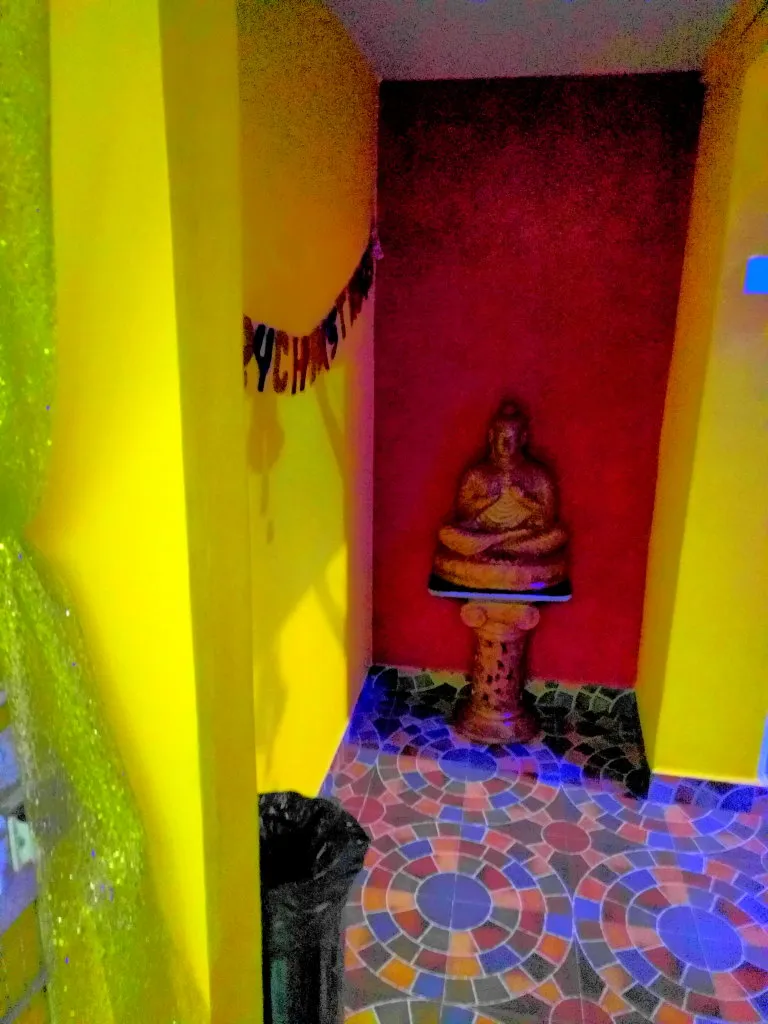
Dive into another section:
1.1, 1.2, 1.3, 1.4, 2.1, 2.2, 2.3, 2.4, 3, 4.1, 4.2, 4.3
Images by @litguru